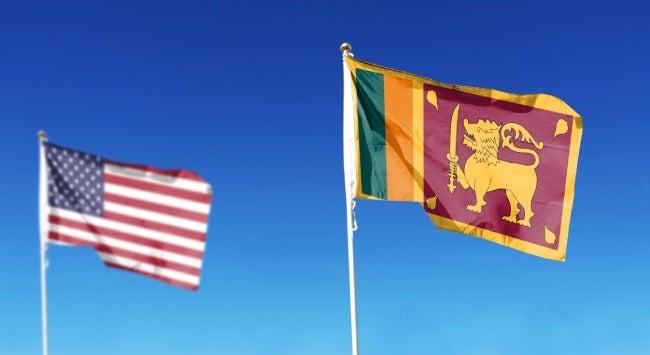Impact of the US’ Reciprocal Tariffs on Sri Lanka:
Between Protectionism and Regionalism
Rajni Gamage, Tanujja Dadlani
27 June 2025Summary
The imposition of reciprocal tariffs by the United States in April this year presents a set of distinct challenges for Sri Lanka, which is grappling with issues of foreign debt, socio-economic inequalities and structural economic imbalances, and must now navigate an increasingly fragmented and power-based global trade environment.
Sri Lanka’s 2022 debt crisis marked a watershed moment, triggering major economic and political upheaval. By 2024, the country reported five per cent growth alongside deep-seated inequality and a sharp increase in poverty rates. These economic hardships led to popular frustrations against the establishment political elite, and the subsequent election of the more centre-left articulating National People’s Power (NPP) in late 2024.
Against this backdrop, the decision by the United States (US) President Donald Trump’s administration to impose 44 per cent reciprocal tariffs on Sri Lanka in April 2025 presents major challenges to the new government. While the Sri Lankan government has announced that it intends to negotiate and appeal the measure, the US has insisted that the tariffs are determined by a set formula, irrespective of diplomatic relations. Following market fluctuations that occurred after the announcement, there has been a 90-day suspension on the implementation of the country’s respective tariffs, until 8 July 2025.
Domestic Impact of the US’ Policy Reversals
The US remains Sri Lanka’s largest single export destination, valued at approximately US$2.8 billion, especially for apparel, rubber-based products, coconut and agricultural goods. More than a quarter of Sri Lanka’s apparel exports are destined for the US, leaving the country vulnerable to trade disruptions and straining its foreign exchange reserves. The cancellation of New Year bonuses by the garment factory Vogue Tex and the sudden closure of Next Manufacturing apparel factory in the Katunayake Free Trade Zone were seen, directly or indirectly, as a response to growing concerns over the impending impact of the US’ tariffs. The apparel industry has a predominantly female workforce, which is particularly vulnerable to such disruptions to the industry.
In response to the US’ tariffs announcement, President Anura Kumara Dissanayake appointed a committee to study the effects of the proposed tariffs and offer proposals on the course of action for Sri Lanka in response to the emerging situation. A high-level Sri Lankan delegation held a meeting with the US Trade Representative Ambassador Jamieson Greer on 22 April 2025 in Washington DC. In a second round of talks on 27 to 28 May 2025, then Deputy Minister of Finance and Planning Harshana Suriyapperuma reaffirmed Sri Lanka’s commitment to reducing trade barriers and strengthening cooperation.
The announcement of these tariff hikes followed the Trump administration’s significant reductions to the US Agency for International Development (USAID), which has had notable implications for countries such as Sri Lanka. The freeze in USAID programmes was reported to have significantly impacted civil society initiatives in Sri Lanka, aligned with national priorities such as agriculture, climate resilience and youth entrepreneurship, and aimed at furthering democracy and human rights. In addition, reductions in USAID funding have also impacted government programmes, including providing expert assistance to parliamentary committees, such as Sectoral Oversight Committees, the Committee on Public Finance and the Women Parliamentarians’ Caucus.
Future of Rules-Based Order and Regionalism
The US, a chief architect of the liberal, rules-based global trade order, appears to be reevaluating its commitment to it. Washington’s unilateral imposition of tariffs on multiple international partners has fueled concerns about a shift toward a zero-sum dynamic, where countries prioritise national gains over collective cooperation in an increasingly fragmented trade environment. In this context, Sri Lanka needs to diversify its economic partnerships and strengthen ties within more stable multilateral and regional frameworks. It is part of initiatives such as the Bay of Bengal Initiative for Multi-Sectoral Technical and Economic Cooperation, the South Asia Subregional Economic Cooperation and the Indian Ocean Rim Association, where it currently holds the chairmanship. In June 2023, Sri Lanka formally expressed interest in joining the Regional Comprehensive Economic Partnership (RCEP) to enhance access to pan-regional markets. Earlier this year, Dissanayake affirmed the NPP government’s intention to expand free trade agreements, particularly with Association of Southeast Asian Nations (ASEAN) member states, through the RCEP and other mechanisms.
However, a collective initiative to respond to issues such as the unilateral imposition of the US’ tariffs is absent. South Asia has seen little economic integration, hindered by political instability and inter-state rivalry. The region’s main regional organisation – the South Asian Association for Regional Cooperation – has been largely ineffective in furthering common regional interests and a pan-regional identity. A major reason for this is the deep-seated mistrust within the region, most recently seen in India’s Operation Sindoor, a military strike on alleged terrorist infrastructure in Pakistan-administered Kashmir. Even in better integrated regions in Asia, such as ASEAN, despite calls for a coordinated response to the new US’ tariffs by some of its member states, a bilateral strategy appears to be the generally preferred option and the eventual ASEAN joint statement commits to not impose any retaliatory measures in response to the US tariffs. In this context, it appears that collective responses to the US tariffs or an appeal to uphold the global rules-based order, by smaller states or the Global South, are unlikely to materialise in the near or medium term.
. . . . .
Dr Rajni Gamage is a Research Fellow at the Institute of South Asian Studies (ISAS), an autonomous research institute at the National University of Singapore (NUS). She can be contacted at r.gamage@nus.edu.sg. Ms Tanujja Dadlani is a Research Analyst at the same institute. She can be contacted at tanujjad@nus.edu.sg. The authors bear full responsibility for the facts cited and opinions expressed in this paper.
Pic Credit: Shutterstock
-
 More From :
More From :
-
 Tags :
Tags :
-
 Download PDF
Download PDF



